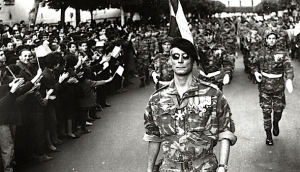The Battle of Algiers
Dir. Gillo Pontecorvo, Algeria/Italy, 1966, drama, music by Ennio Morricone
From Wikipedia
The film has been critically celebrated and often taken, by insurgent groups and states alike, as an important commentary on urban guerrilla warfare. It occupies the 48th place on the Critics’ Top 250 Films of the 2012 Sight & Sound poll as well as 120th place on Empire magazine’s list of the 500 greatest movies of all time.
Algeria gained independence from the French, a matter which Pontecorvo portrays in the film’s epilogue. The film concentrates on the years between 1954 and 1957 when the guerrilla fighters regrouped and expanded into the Casbah, which was met by French paratroopers attempting to regain territory. The highly dramatic film is about the organization of a guerrilla movement and the methods used by the colonial power to contain it.
A subject of socio-political controversy, the film wasn’t screened for five years in France, where it was later released in 1971.
In spite of its status as the classic among the classics all over the world, it has been out of circulation in Japan for decades. In 1966, it was awarded the Golden Lion at Venice, ranked #1 on Kinema Junpo in Japan, and banned in France (for many years). Then in 2003, it was screened for the Special Operations Command at the Pentagon. You will know the reason if you see the film. This screening was made possible with the generous support from the world-wide (outside of Italy) rights holder of the film. Do not miss it!
Crew:
Director: Gillo Pontecorvo
Screenplay: Franco Solinas and Gillo Pontecorvo (Based on Souvenirs de la Bataille d’Alger by Saadi Yacef)
Music: Ennio Morricone
The Cast:
Brahim Hadjadj as Ali La Pointe
Jean Martin as Colonel Mathieu (only professional actor)
Saadi Yacef as Saadi Yacef (Djafar)
Reception:
Golden Lion at the Venice Film Festival
3 Academy Awards Nomination for Best Screenplay (Gillo Pontecorvo and Franco Solinas) and Best Director (Gillo Pontecorvo) in 1969. and Best Foreign Language Film in 1967.
Kinema Junpo ranking #1 (Japan, 1966)
Best Film of 1967 by Cuban critics
The United Churches of America Prize (1967)
In 2010, the movie was ranked sixth in Empire magazine’s “The 100 Best Films Of World Cinema”.

